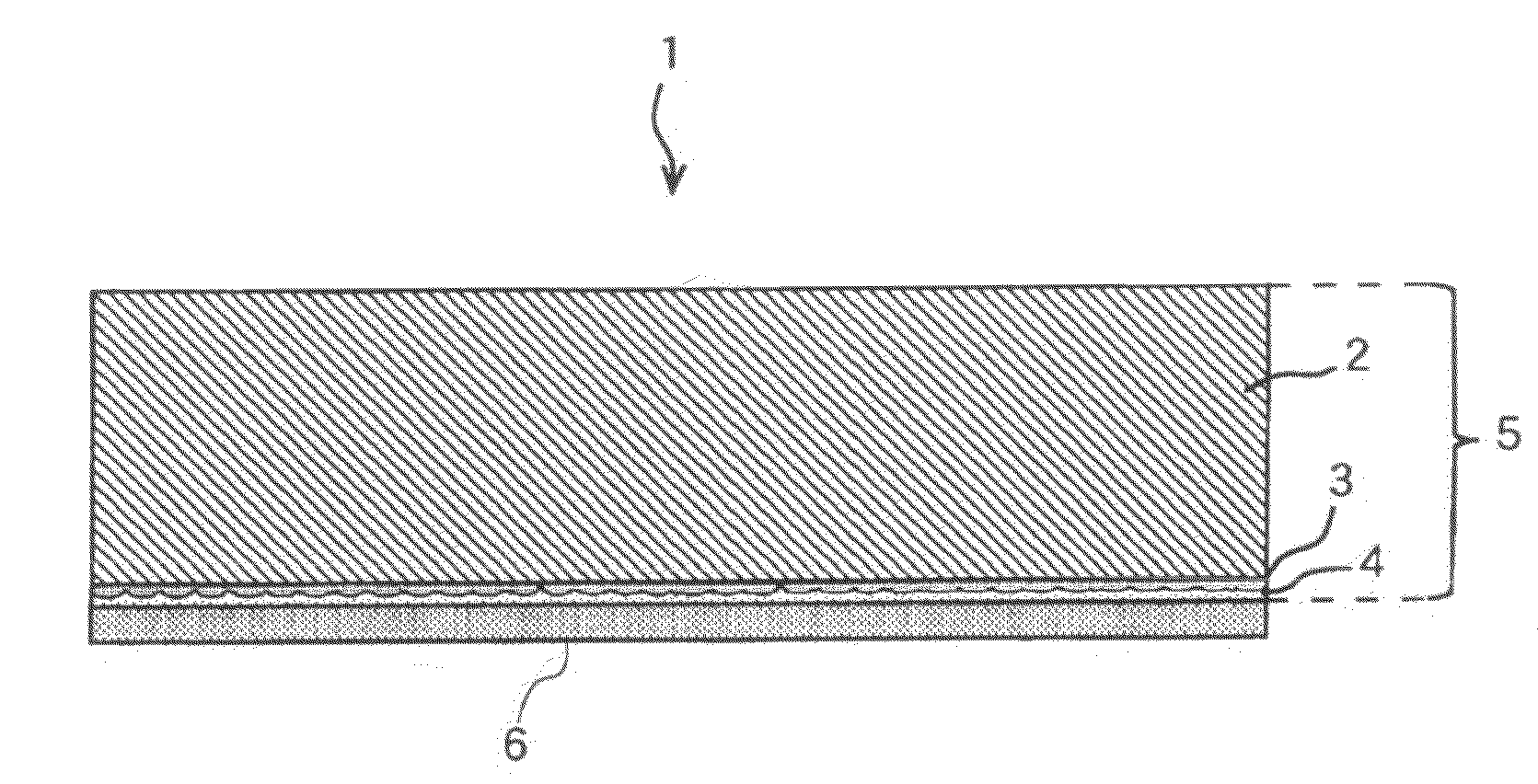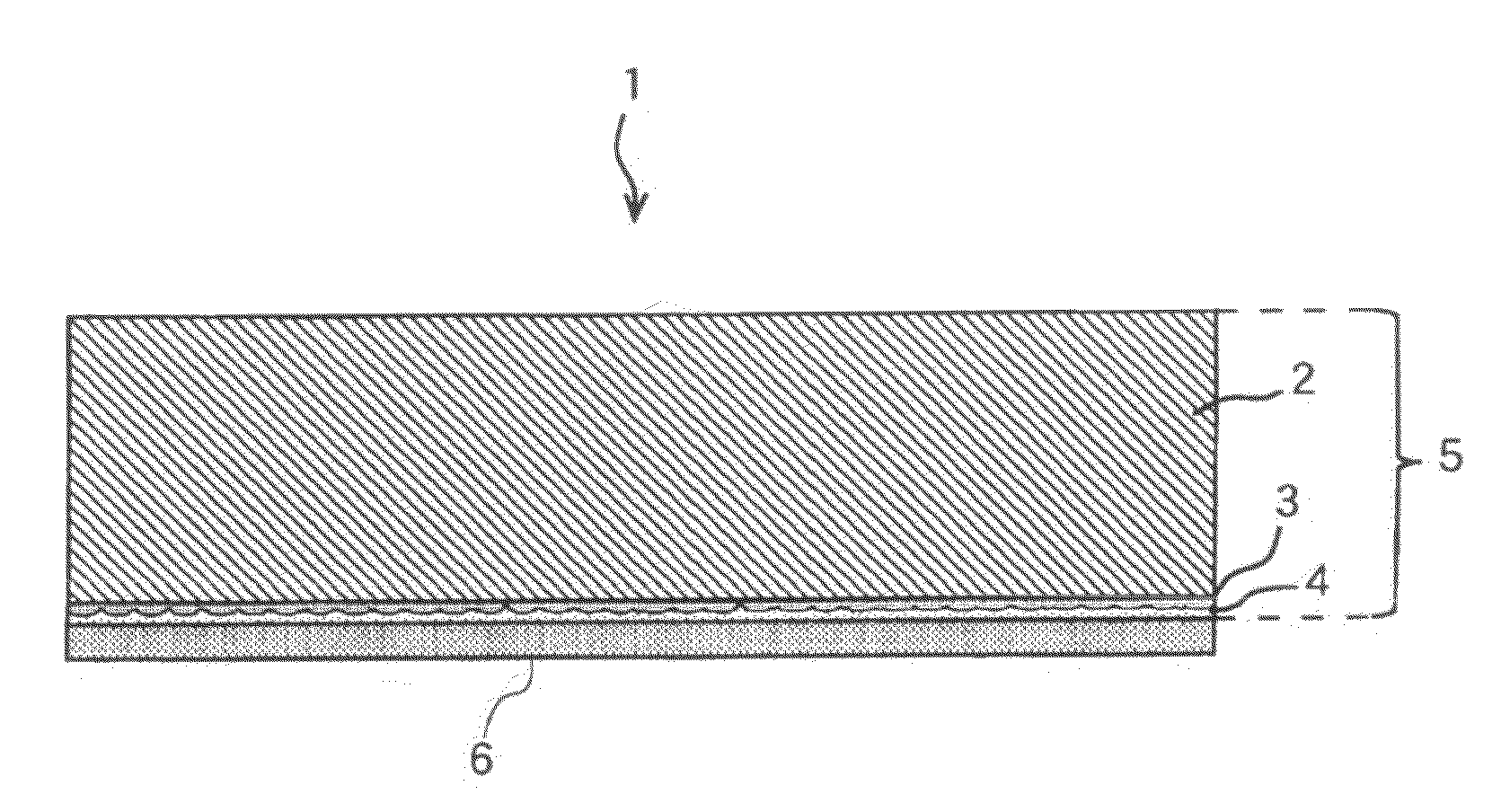Surface-treated copper foil, manufacturing method of the surface-treated copper foil, and surface-treated copper foil coated with very thin primer resin layer
a manufacturing method and copper foil technology, applied in the direction of metallic pattern materials, synthesized resin layered products, record information storage, etc., can solve the problems of hexavalent chromium being considered to be almost unrealizable, more toxic in biological ways, and more serious environmental pollution, so as to achieve good solder blistering effect, less peel loss, and good sealing
- Summary
- Abstract
- Description
- Claims
- Application Information
AI Technical Summary
Benefits of technology
Problems solved by technology
Method used
Image
Examples
example 1
(Preparation of the Surface-Treated Copper Foil)
[0102]In Example 1, the surface-treated copper foil was prepared by performing roughening treatment followed by a rust-proofing treatment, and a silane coupling agent treatment on matte side (surface roughness Ra: 0.64-micron meter, Rzjis: 3.0-micron meter) of an 18-micron meter thick untreated electrodeposited copper foil (hereinafter simply referred to as “untreated foil”). Process in detail will be described step by step.
Cleaning Treatment:
[0103]The untreated foil was first washed with an acidic solution to clean surface by removing an oil and / or fat components and surface oxide layer. The solution used was dilute sulfuric acid with sulfuric acid concentration of 150 g / L with solution temperature of 30° C. and immersed for 30 seconds, followed by rinsing with water.
Roughening Treatment:
[0104]The untreated foil after finishing of cleaning was then cathode-polarized for electrolysis under burning plating conditions in a copper sulfate...
example 2
(Preparation of the Surface-Treated Copper Foil)
[0118]In Example 2, a surface-treated copper foil was prepared by performing a rust-proofing treatment followed by a silane coupling agent treatment on a shiny side (surface roughness Ra: 0.25-micron meter, Rzjis: 1.2-micron meter) of an 18-micron meter thick untreated electrodeposited copper foil (hereinafter simply referred to as “untreated foil”). It means that the surface-roughening treatment was omitted. The process will be described in detail step by step.
Cleaning Treatment:
[0119]The untreated foil was washed with an acidic solution for surface cleaning to remove an oil, fat component and surface oxide layer in the same manner as in Example 1.
Rust-Proofing Treatment:
[0120]The untreated copper foil itself was cathode-polarized after finishing of cleaning to form a nickel layer and a tin layer in this order on the shiny side with the same nickel and tin electrolytic solutions as in Example 1. Total 8 samples, Samples 2-1 to 2-8, we...
example 3
(Preparation of the Surface-Treated Copper Foil)
[0130]In Example 3, a surface-treated copper foil was prepared by performing a rust-proofing treatment followed by a silane coupling agent treatment on a shiny side (surface roughness Ra: 0.25-micron meter, Rzjis: 1.2-micron meter) of an 18-micron meter thick untreated electrodeposited copper foil (hereinafter simply referred to as “untreated foil”). It means that the surface-roughening treatment was omitted. The process will be described in detail step by step.
Cleaning Treatment:
[0131]The untreated foil was washed with an acidic solution for surface cleaning to remove an oil, fat component and surface oxide layer in the same manner as in Example 1.
Rust-Proofing Treatment:
[0132]The untreated copper foil itself was cathode-polarized after finishing of cleaning to form a nickel layer and a tin layer in this order on the shiny side with the same nickel and tin electrolytic solutions as in Example 1. A total of 4 samples, Samples 3-1 to 3-...
PUM
| Property | Measurement | Unit |
|---|---|---|
| width | aaaaa | aaaaa |
| concentration | aaaaa | aaaaa |
| temperature | aaaaa | aaaaa |
Abstract
Description
Claims
Application Information
 Login to View More
Login to View More - R&D
- Intellectual Property
- Life Sciences
- Materials
- Tech Scout
- Unparalleled Data Quality
- Higher Quality Content
- 60% Fewer Hallucinations
Browse by: Latest US Patents, China's latest patents, Technical Efficacy Thesaurus, Application Domain, Technology Topic, Popular Technical Reports.
© 2025 PatSnap. All rights reserved.Legal|Privacy policy|Modern Slavery Act Transparency Statement|Sitemap|About US| Contact US: help@patsnap.com



